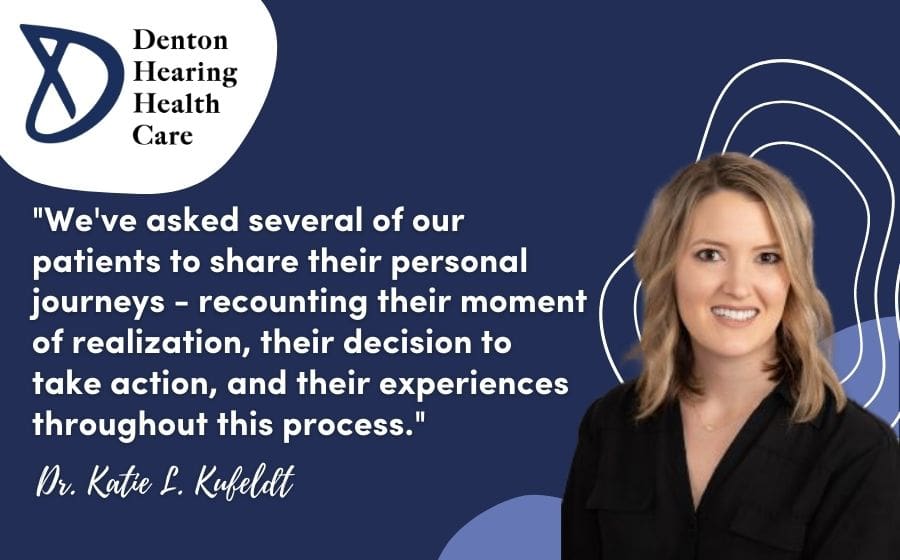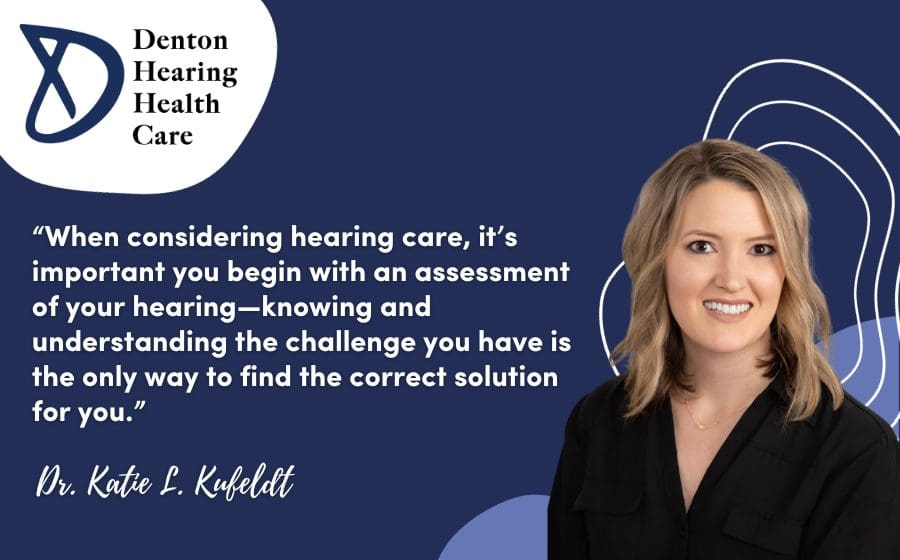Living with tinnitus can be a frustrating and overwhelming experience. The constant ringing or buzzing sounds in your ears that only you can hear can disrupt your daily life and take a toll on your mental health.
When tinnitus impacts your ability to work, sleep, and socialize, you may feel isolated and anxious—and those feelings are completely valid. But the good news is that you don’t have to suffer alone.
At Denton Hearing, our team is here to help you regain control and find relief from your tinnitus symptoms. You’re not alone in your tinnitus journey—tinnitus impacts around 75 percent of the population in the United States at some point.
There are many effective treatment options and supportive resources available today. Let’s explore some ways we can work together to manage your tinnitus symptoms and improve your well-being.
Understanding the Impact Tinnitus Can Have on Mental Health
Tinnitus can feel like an invisible symphony in your head that plays on and on without rest. Depending on the underlying cause, tinnitus may only be a temporary inconvenience that resolves with time.
But lingering or permanent tinnitus can contribute to more serious conditions like anxiety, depression, extreme anger, social isolation, and suicidal ideation.
Since tinnitus and hearing loss aren’t visible disabilities, others you interact with in your day-to-day life might not be aware of the condition you’re struggling with.
When you can’t hear properly, engaging in conversations can be taxing. Asking others to repeat themselves can be uncomfortable, and it can be tempting to shut down and isolate yourself.
When learning to cope with tinnitus, it’s crucial to understand the signs of mental illness and ensure you have access to mental health resources and a solid support system.
How We Treat Tinnitus at Denton Hearing
If you’re struggling with tinnitus, always seek the help of a medical professional. At Denton Hearing, our team of hearing health experts can help you find the best treatment to manage your symptoms and improve your quality of life. Some of the ways we can help treat your tinnitus symptoms are:
Medications:
Did you know that some medications can actually cause tinnitus? Sometimes switching to a different medication can help alleviate tinnitus symptoms.
If your tinnitus is causing symptoms of anxiety or depression, certain medications may be prescribed to manage those conditions as well.
Acoustic therapy:
Acoustic therapy involves using a sound generator or device to produce white noise that masks the ringing or buzzing you hear. A portable sound generator or fan can be used at home to help mask tinnitus, since your brain can only focus on one sound at a time.
Music therapy:
If you aren’t a fan of the sound of white noise, music therapy might be a better option for you. Music therapy is effective at soothing your limbic system, which is responsible for processing the negative emotions you may experience when coping with tinnitus
Auditory Habituation/Tinnitus Retraining Therapy:
Tinnitus Retraining Therapy (TRT) is a highly effective treatment that combines counseling and sound masking. You’ll learn empowering strategies for managing the stress, anxiety, and insomnia that can accompany tinnitus.
Low-level masking noises produced by devices help to reduce the intensity of the noise of tinnitus and help you become accustomed to it.
Hearing aids:
Hearing aids can help effectively manage the symptoms of tinnitus for people who suffer from hearing loss. Some hearing aids have masking technology, which works to minimize the noise from tinnitus by amplifying background sounds or adding acoustic therapy.
Although tinnitus can’t be cured, with the right treatment our tinnitus patients are able to live happy and fulfilled lives.
Resources and Groups to Support You on Your Tinnitus Journey
The American Tinnitus Association (ATA) is a valuable resource for individuals experiencing tinnitus. The ATA is a non-profit organization that aims to empower tinnitus patients, healthcare providers, and researchers.
The ATA website offers a wealth of knowledge for tinnitus sufferers and their families, including coping strategies and access to local support groups and a volunteer support network.
If you’re struggling with tinnitus, joining a support group can improve your quality of life.
Connecting with others who share your experience provides a safe haven for understanding and empathy, and it can have a positive impact on your mental health as you learn to cope with your symptoms. Many groups conveniently meet online.
The Hearing Health Foundation is another great organization working to promote hearing health and support research on tinnitus. Their website offers educational resources for tinnitus patients as well as their loved ones—like these communication tips for talking to a person with hearing loss.
Tinnitus in Popular Culture
Tinnitus can impact anyone, and more and more public figures have begun to speak up and share their experiences with tinnitus.
Musicians like Eric Clapton and Chris Martin have been vocal about their experiences with the condition.
By sharing their stories, they’ve helped to shine a spotlight on tinnitus and provide inspiration for others who are coping with tinnitus symptoms.
It’s important to continue to raise awareness about tinnitus and the mental health issues that can accompany it so that others can take proactive steps to protect their hearing health and mental well-being.
Tinnitus in Popular Culture
Tinnitus can impact anyone, and more and more public figures have begun to speak up and share their experiences with tinnitus.
Musicians like Eric Clapton and Chris Martin have been vocal about their experiences with the condition.
By sharing their stories, they’ve helped to shine a spotlight on tinnitus and provide inspiration for others who are coping with tinnitus symptoms.
It’s important to continue to raise awareness about tinnitus and the mental health issues that can accompany it so that others can take proactive steps to protect their hearing health and mental well-being.
Regain Your Quality of Life
At Denton Hearing, we are committed to providing the best treatment and support for patients dealing with tinnitus. We’ll work with you to determine the best treatment for your unique case and will support you every step of the way.
We understand your struggle and are here to partner with you on your journey and help you regain your quality of life.
If you’re concerned about tinnitus, schedule a tinnitus assessment with our experts.





